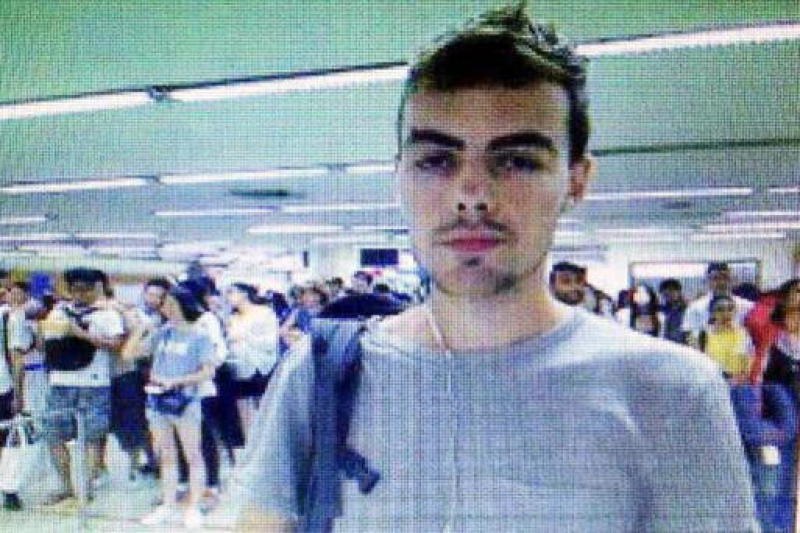Singapore agrees not to cane StanChart robbery suspect in exchange for getting him extradited here
Sign up now: Get ST's newsletters delivered to your inbox

British laws prohibit the authorities from extraditing David James Roach, accused of robbing StanChart Bank's Holland Village branch in 2016, without an assurance that corporal punishment will not be carried out if he is found guilty.
PHOTO: SCREENGRAB FROM NATION TV
SINGAPORE - The man suspected of carrying out the 2016 Standard Chartered Bank robbery will not be caned even if he is convicted of the offence here.
Singapore is willing to give this assurance to pave the way for the suspect - Canadian David James Roach, 28 - to be extradited here from Britain to face charges.
The Ministry of Home Affairs (MHA), which is working with British authorities on the case, said in a statement on Tuesday (Feb 20): "As part of the extradition proceedings, the UK Government has requested an assurance that if Roach were to be found guilty by a Singapore Court of robbery, the sentence of corporal punishment will not be carried out."
Singapore has an extradition treaty with Britain, but British laws prohibit the authorities from extraditing Roach without such an assurance.
Britain abolished caning as a punishment for criminals in 1948.
"The provision of the assurance is being done to try and ensure that Roach does not escape justice, and does not affect the general position taken by Singapore on corporal punishment," said the MHA.
Roach is accused of robbing StanChart Bank's Holland Village branch of $30,000 on July 7, 2016. He allegedly handed the teller a note with his demands then fled to Bangkok with the money on the same day.
He was arrested three days later in Bangkok and was held in remand.
Roach was sentenced to 14 months' jail in Thailand last June for violating money laundering and customs laws. He had carried more than US$20,000 (S$26,000) - believed to be the robbery proceeds - when he entered Thailand.
Media reports said Roach was being deported from Bangkok to Canada and was in transit in London when he was arrested on Jan 11.
The Canadian national's extradition to Singapore is being sought on one count of robbery under section 392 of the Penal Code, which can carry a maximum of 10 years' jail and at least six strokes of the cane.
Another count of money laundering is also being sought, under section 47(1)(b) of the Corruption, Drug Trafficking and Other Serious Crimes (Confiscation of Benefits) Act. This carries a maximum sentence of a $500,000 fine or 10 years' imprisonment.
Cases where such an assurance is given are "exceptional" and are undertaken when it is "the only means" to secure an extradition, said National University of Singapore law professor A. Kumaralingam.
"This is a necessary concession in order to respect the laws of the extraditing country and to ensure that the accused person faces justice in Singapore," he said.
For example, British national Michael McCrea, who was involved in a double murder case in 2002, was extradited from Australia in 2005 only after Singapore agreed he would not be hanged. The murder charges were later downgraded to culpable homicide.
McCrea, who hid the victims' bodies in the Orchard Towers' carpark, was sentenced to 24 years' jail in 2006.
-
The McCrea case
Michael McCrea was extradited to Singapore in 2005 after the authorities promised Australia that the Briton, wanted for a couple's death here, would not face the death penalty if convicted for murder.
The former financial adviser, then 48, was initially wanted for the murder of his chauffeur Kho Nai Guan, 46, and Mr Kho's girlfriend, Chinese national Lan Ya Ming, 29, in January 2002.
He had tried to hide the bodies, and enlisted the help of three others to clean up the evidence in his Balmoral Park apartment. The bodies were abandoned in his car at the Orchard Towers carpark.
McCrea fled to London after the killings and later made his way to Melbourne, where he was arrested in June 2002. He spent the next three years fighting his extradition to Singapore. Australia allowed his return to Singapore on condition that he not be given the death penalty.
When McCrea was brought back, he was charged with two counts of murder. But the charges were later reduced to culpable homicide, and he was jailed for 24 years.
Under the Penal Code, the punishment for murder is death or life imprisonment. The punishment for culpable homicide is life imprisonment and caning, or up to 20 years' jail, with caning or a fine.
In a case where caning is mandatory, such as robbery, the punishment can be avoided only if the charge is amended to one that does not require such a sentence.
"The Public Prosecutor, who has discretion to select the charge, will select appropriate alternative charges to prosecute the accused," said Prof Kumaralingam.
Another route to uphold such assurances would be for the President to grant pardons or clemency to remove sentences, as enshrined in the Singapore Constitution, said Singapore Management University Assistant Professor of Law Eunice Chua.
The Straits Times understands this route would mean that Roach is charged in court but the caning sentence gets remitted under the President's grant of pardon.
Prof Chua said this provision was used in the 1994 case of American teenager Michael Fay, who was caned for vandalising cars and public property.
She said: "(Then President Ong Teng Cheong) reduced Fay's caning sentence from six strokes to four out of consideration for then United States President Bill Clinton's request as it valued Singapore's good relations with the US."
Roach's case was last heard at Westminster Magistrates' Court in London on Feb 15. He told the court that he would contest his extradition.
When contacted, Roach's lawyer Sundeep Pankhania said his client declined comment.


